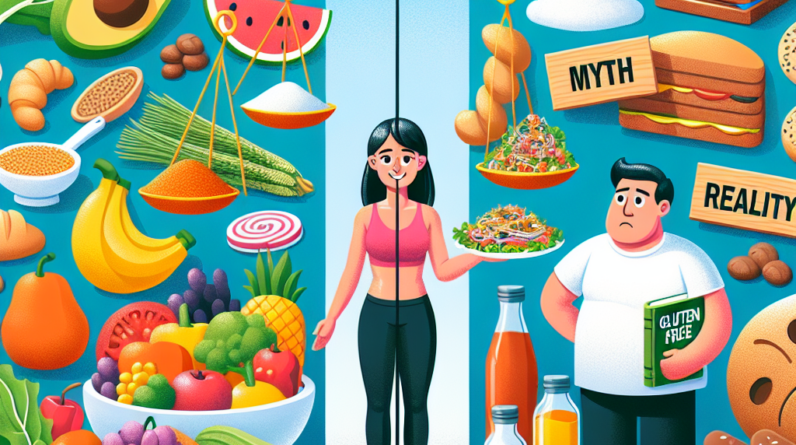
Understanding What Gluten Is
What is Gluten?
Ah, gluten! It’s one of those words that’s become a buzzword for health discussions lately. So, what exactly is it? Gluten is a group of proteins found mostly in wheat, barley, and rye. In simpler terms, it acts like a glue that holds food together, giving it that lovely chewy texture we all enjoy in bread and pasta!
Get a Huge Discount and Bonus! Try for 90 Days Risk Free
But here’s the kicker: while most folks can digest gluten without any issues, there are a few who find it troublesome. For them, gluten can trigger conditions like celiac disease, wheat allergies, or non-celiac gluten sensitivity. So it’s a pretty big deal for a small percentage of the population.
In my experience, understanding gluten helped me appreciate the dietary choices of others. It’s crucial to separate fact from fiction, especially when it comes to popular diets that tout gluten elimination as a cure-all.
Why People Avoid Gluten
Many people avoid gluten for a myriad of reasons. Some have legitimate medical conditions that require them to steer clear, like celiac disease. Others believe that a gluten-free diet is healthier or can promote weight loss.
From my perspective, the common belief that gluten-free automatically equals healthier isn’t entirely accurate. While gluten-containing foods can be unhealthy, there are just as many gluten-free options that are loaded with sugars and fats. So, ditching gluten doesn’t always guarantee you’re eating better.
I’ve also chatted with folks who think they feel better off gluten, and while the mind is a powerful thing, it’s important to look at hard evidence rather than anecdotal experiences.
Gluten Myths Debunked
Let’s clear the air—myths about gluten-free diets can be more rampant than you’d think. One common misconception is that gluten-free diets are low-carb. Not true! Many gluten-free products are high in carbs, and just because something is gluten-free doesn’t mean it’s healthy.
Another myth is that gluten causes weight gain. Again, not necessarily—eating too much of anything can lead to extra pounds. It’s all about moderation and choosing the right foods.
From my own journey, I realized that relying purely on gluten-free products without considering overall nutrition can lead to imbalances. It’s essential to equip ourselves with knowledge and not fall for every trend that pops up.
Get a Huge Discount and Bonus! Try for 90 Days Risk Free
The Health Implications of Going Gluten-Free
Possible Nutritional Deficiencies
When someone decides to go gluten-free, it’s essential to understand that they may be missing out on certain nutrients. Many whole grains rich in fiber, iron, and B vitamins are off the table, and these are vital for our health.
I know several friends who went gluten-free and found themselves low on fiber, which can lead to digestive issues. It’s a bummer when people can’t enjoy their favorite foods anymore, but it’s so important to substitute with other nutrient-dense options like quinoa, brown rice, and legumes.
A balanced approach is what I advocate. If you’re going gluten-free, make sure you’re replacing that void with foods that provide the nutrients you might be missing.
Effects on Mental Health
Interestingly enough, gluten-free diets can also affect mental health. Some studies suggest that fluctuations in gluten intake may impact mood and energy levels. However, this varies per individual.
Need a Serious Energy BOOST? Huge Discount Try for 90 Days Risk Free
From my perspective, anyone dealing with food sensitivities should listen to their body. It can be stressful to navigate what to eat, and I remember times feeling overwhelmed at grocery stores trying to decipher labels. Anxiety and stress can definitely creep in, especially if meals become complicated.
It’s also worth noting that when people cut gluten, they often find themselves more attuned to their overall eating habits, which can lead to positive health transformations—if approached mindfully!
Long-Term Commitment and Effects
I’ve seen that for many, adopting a gluten-free lifestyle is more than just a diet; it’s a commitment. Some people embrace it wholeheartedly, while others struggle to maintain such restrictions over time.
That said, if you’re considering going gluten-free, be prepared for long-term changes. It’s not just about the food; it’s about your social life, dining out, and grocery shopping. I’ve had my share of awkward moments at parties where my options were limited because of my choices.
Nevertheless, I’m a firm believer in the idea that finding the balance that works for you is critical, rather than feeling pressured to conform to dietary trends.
Good Health Solution is Easier Than Most People Think!
Take a Look for Yourself!
Identifying Gluten Sensitivity
Signs and Symptoms
If you think you might have a gluten sensitivity, keep an eye out for certain symptoms. Digestive issues like bloating, gas, diarrhea, and constipation are common complaints. But it doesn’t stop there; headaches, fatigue, and joint pain could also be signals that you need to explore further.
I remember when I first started noticing symptoms in my life. It felt silly at first, but paying attention to what I was eating made all the difference. Journaling helped me identify what foods triggered discomfort.
If you suspect gluten might be causing you grief, don’t hesitate to chat with a healthcare professional for personalized advice and testing options.
Testing for Sensitivity
Once you recognize potential symptoms, it’s crucial to get tested properly before switching to a gluten-free diet. Going gluten-free prematurely can lead to inaccurate test results.
I can’t emphasize enough how important it is to consult with a healthcare provider about testing. They can guide you through blood tests and, if necessary, a biopsy to determine if celiac disease is a concern.
Through my own experience and research, I’ve realized that understanding your body is key. Testing ensures you’re not guessing and that you’re making informed decisions about your health.
Gradual Changes Over Time
If you do decide to go gluten-free, consider making gradual dietary changes. It’s easy to go headfirst into a new lifestyle, but sometimes that can backfire. Start by swapping out a couple of gluten-filled staples with gluten-free alternatives and see how you feel.
I often find that integrating change bit by bit works best. Having a burger on a lettuce wrap instead of a bun or making gluten-free pasta at home were effective starting points for me.
Over time, you’ll likely find a rhythm that works for you. Embrace the learning process and honor your unique journey.
Conclusion: The Importance of a Balanced Approach
In wrapping this all up, I want to stress that understanding gluten and its effects on your health is super important. Whether you have to avoid it for medical reasons or you’re just curious about the buzz, being informed is key. The gluten-free path can be a bit tricky, but with some knowledge and self-awareness, you can navigate it smoothly.
Remember—food is meant to be enjoyed! Whether gluten is involved or not, the ultimate goal should be finding a balance that makes you feel great.
So, go on, explore, and make choices that honor your health while also celebrating the joy of eating!
FAQ
1. What exactly is gluten?
Gluten is a group of proteins found in wheat, barley, and rye that helps foods maintain their shape. It’s responsible for the elasticity in dough and the chewiness in bread.
2. Can anyone go gluten-free?
Yes, anyone can choose to go gluten-free; however, it’s essential to do so mindfully and ensure you’re still receiving the necessary nutrients.
3. How can I tell if I’m gluten-sensitive?
Common signs include digestive issues, headaches, fatigue, and joint pain. If you suspect you have a sensitivity, it’s best to consult with a healthcare professional for proper testing.
4. Are gluten-free products always healthier?
Not necessarily! Many gluten-free products can be high in sugar and fat. It’s crucial to read labels and choose nutrient-dense options.
5. Should I avoid gluten if I don’t have a sensitivity?
That depends on your individual health goals. Generally speaking, if you tolerate gluten well, there’s no need to eliminate it from your diet. Focus on balance and moderation instead!








